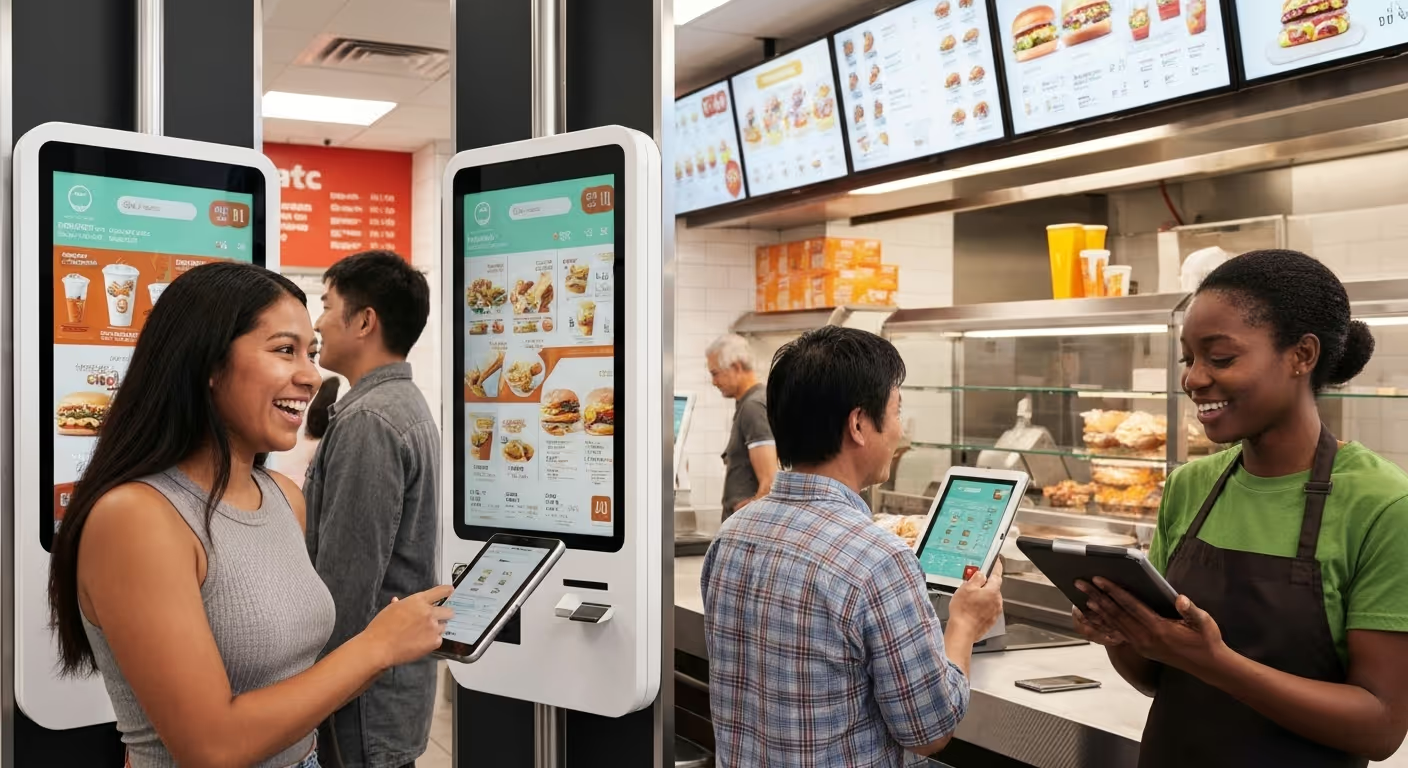
MIN READ -
September 6, 2025
Integrated Solutions Manager
The quick-service restaurant industry remains a dominant force, with the franchise model offering entrepreneurs a proven path to ownership. For franchise brands, maintaining brand consistency across hundreds or even thousands of locations is the cornerstone of success. As technology evolves, artificial intelligence (AI) is emerging as a critical tool for franchise owners. It provides the data-driven insights and automation needed to enhance efficiency, meet consumer demand, and ensure every customer receives the same high-quality experience, no matter which location they visit.
Artificial intelligence is no longer a futuristic concept in the fast food world; it's a present-day reality creating a significant competitive advantage. For those exploring a franchise opportunity, understanding AI’s role is crucial. It offers powerful operational support that addresses rising consumer demand for speed and personalization.
From the kitchen to the customer-facing kiosk, AI is optimizing every touchpoint. How can AI make drive-thru service faster and more accurate? By using voice recognition to take orders and predictive algorithms to suggest popular items, AI reduces errors and speeds up the entire process, paving the way for impressive franchise growth. These advancements are frequently highlighted in publications like QSR Magazine as key drivers of modern success.
The drive-thru is a critical revenue stream for most QSRs, and speed is everything. AI-powered voice assistants are now being deployed to handle order-taking with remarkable precision. These systems use machine learning to understand various accents, dialects, and even complex orders, which significantly reduces the chance of human error. This frees up employees to focus on food preparation and final order assembly.
This technology answers a key question for franchise owners: "How can AI make drive-thru service faster and more accurate?" By automating the initial point of contact, these systems streamline the entire workflow. The AI can instantly send the order to the kitchen display system, eliminating delays and ensuring the food is prepared correctly the first time. This boosts throughput, especially during peak hours.
Ultimately, this leads to a better customer service experience. Faster lines and accurate orders translate directly to happier customers who are more likely to return. For franchise owners, this improved efficiency strengthens the bottom line and helps their locations better align with evolving consumer preferences for quick and frictionless service.
Understanding what your customers will want to eat tomorrow, next week, or even next month is a powerful advantage. AI-powered predictive analytics makes this possible by analyzing historical sales data, local events, weather patterns, and current market trends. This allows QSR franchises to move beyond guesswork and make data-informed decisions about their offerings.
So, can AI predict customer demand for menu items in real time? Yes, and with increasing accuracy. These systems can identify subtle shifts in consumer demand, such as a growing preference for plant-based options or a surge in interest for a limited-time offer. This information is invaluable for menu optimization, helping franchise owners decide which items to promote and which to potentially phase out.
By aligning the menu more closely with what customers actually want, franchises can maximize sales and reduce food waste. This proactive approach ensures that popular ingredients are always in stock while preventing over-ordering of less popular ones. It gives franchise owners a strategic edge in a competitive market.
Long lines are a major deterrent for customers and a clear sign of operational inefficiency. Smart queue management tools powered by AI provide a powerful solution to this common problem. By using cameras and sensors, these systems offer real-time analytics on customer flow, helping managers identify bottlenecks before they spiral out of control and damage customer satisfaction.
What AI tools help QSRs cut down wait times during rush hours? Several technologies are making a direct impact:
With this data, franchise owners can make immediate adjustments, such as opening another register or deploying staff to guide customers to self-service kiosks. This proactive approach to queue management not only improves the experience for your customer base but also maximizes the number of transactions you can process, boosting operational efficiency and revenue.

Managing food inventory effectively is a constant challenge for QSRs, where tight margins make every ingredient count. AI is revolutionizing this process by automating inventory tracking and forecasting. Instead of relying on manual counts and estimates, AI systems can monitor stock levels in real time and predict future needs with high accuracy, ensuring franchise units have what they need without overstocking.
So, how are QSRs using AI to manage food inventory and reduce waste? These systems integrate with sales data to understand consumption patterns for every menu item. For instance, if the AI predicts a spike in burger sales due to an upcoming local event, it can automatically recommend ordering more buns and patties, preventing stockouts and lost sales. This provides critical operational support.
This level of precision is instrumental in waste reduction. By ordering only what is needed, franchises can significantly cut down on spoilage, a major cost center. The technology can also streamline the supply chain by automating purchase orders and tracking deliveries, ensuring that all franchise units operate with maximum efficiency and minimal waste.
Generic upsell prompts like "Would you like to supersize that?" are becoming a thing of the past. AI is enabling a far more sophisticated approach to personalized upselling and suggestive selling, particularly at self-service kiosks. These smart systems can analyze a customer's current order and past purchase history to make relevant and appealing suggestions, increasing the average check size.
What role does AI play in creating personalized upsells at the counter or kiosk? It acts as a digital sales expert that tailors recommendations in real time.
This technology transforms the kiosk from a simple ordering tool into an active part of your marketing campaigns. By presenting customers with offers that genuinely match their preferences, the franchise system can drive incremental sales without being pushy. This enhances the customer experience and boosts revenue for the entire franchise system.
In today's digital-first world, customers expect to place orders through websites, mobile apps, and even social media. AI chatbots are becoming the frontline of customer service in these channels, capable of handling a high volume of interactions simultaneously. These bots can guide users through the menu, answer questions about ingredients, and finalize orders without any human intervention.
A common question is, can AI-powered chatbots take customer orders as well as humans? In many cases, they can do it even better. Chatbots are available 24/7, never get tired, and can process orders with perfect accuracy. They are programmed to understand customer needs and can handle customizations and special requests flawlessly, which are then sent directly to the kitchen.
For anyone considering a franchise opportunity, implementing AI chatbots provides a scalable solution for order processing. It reduces the burden on in-store staff, allowing them to focus on food quality and in-person interactions. This improved efficiency and accessibility make the franchise more attractive to modern consumers and contribute to a stronger business model.
Consistent employee training is essential for maintaining brand standards, but it can be time-consuming and costly, especially for new franchisees. AI offers a modern solution by providing interactive and personalized training modules. These platforms can simulate real-world scenarios, such as handling a difficult customer or operating a new piece of equipment, in a risk-free virtual environment.
How do QSR franchises use AI to train and support staff? They use AI-driven platforms to deliver comprehensive training that is accessible on demand. New hires can learn at their own pace, and the system can track their progress, identifying areas where they might need additional help. This ensures every employee receives the same high-quality instruction, a key aspect of franchisee support.
This technology is particularly valuable for new franchisees who are learning the business from the ground up. The franchise disclosure document may outline the training requirements, and AI can help fulfill them efficiently. Furthermore, AI can provide ongoing support by acting as a digital knowledge base where employees can quickly look up procedures or get answers to questions, ensuring smooth and consistent operations.
The rise of third-party delivery apps has expanded the reach of QSRs, but it has also introduced new challenges, particularly with order accuracy. AI integration provides a powerful solution by creating a seamless link between the restaurant's point-of-sale system and the delivery apps. When an order is placed, AI ensures it is transmitted to the kitchen correctly, minimizing errors from manual entry.
What’s the impact of AI on delivery apps and order accuracy in QSRs? The impact is transformative. AI can double-check orders against the menu to flag potential mistakes before they are made. It can also optimize the entire dispatch process, from ensuring all items are packed correctly to coordinating driver pickup times. This focus on operational efficiency is crucial for a positive customer experience.
For franchises focused on expansion, mastering delivery is non-negotiable. A reliable and accurate delivery service builds trust and encourages repeat business. By leveraging AI to perfect this part of the operation, franchise owners can confidently grow their off-premises business, knowing that every customer will receive exactly what they ordered, every time.
Beyond enhancing the customer-facing experience, AI is revolutionizing the back-of-house, delivering major operational improvements. For franchise owners, the ability to automate routine tasks and gain deep insights into performance is a game-changer for their business model. These tools help turn raw data into actionable strategies that drive profitability and growth.
So, how can AI help franchise owners track and improve daily operations? By providing a centralized dashboard to monitor key metrics, automate labor scheduling, and create smarter customer loyalty programs. These advancements empower owners to make faster, more informed decisions. The following sections explore how AI-driven analytics, scheduling, and retention strategies are boosting operational efficiency.

Franchise owners need a clear, up-to-the-minute view of how their business is performing. AI-powered analytics platforms provide just that, consolidating data from sales, labor, and inventory into an easy-to-understand dashboard. This allows owners to track key metrics across one or multiple franchise units in real time, moving beyond outdated weekly or monthly reports.
This technology directly answers the question, "How can AI help franchise owners track and improve daily operations?" by making data accessible and actionable. For example, an owner can see immediately if a specific location is experiencing longer-than-average wait times or if a promotional item is underperforming. Armed with this information, they can intervene quickly to address issues and optimize performance.
This approach helps franchise brands maintain high standards of customer satisfaction and operational excellence. By using predictive analytics, the system can even forecast future performance and alert owners to potential opportunities or challenges.
Creating employee schedules is a complex and time-consuming task that directly impacts labor optimization. AI-driven scheduling tools automate this process by using real-time analytics and predictive algorithms. The system analyzes historical sales data, upcoming promotions, and even local weather forecasts to predict customer traffic patterns with remarkable accuracy.
Based on these predictions, the AI generates an optimal schedule that ensures the right number of employees are on duty at all times. This prevents both overstaffing during slow periods, which wastes money, and understaffing during rushes, which hurts service and burns out employees. This contributes directly to a more efficient business model.
This is a key way AI helps franchise owners track and improve daily operations. By taking the guesswork out of scheduling, owners can reduce labor costs while improving operational efficiency. The system can also manage time-off requests and shift swaps automatically, freeing up managers to focus on franchisee training and team development.
Standard loyalty programs that offer the same rewards to everyone are no longer enough to ensure customer retention. AI allows franchises to create highly personalized loyalty programs that make each customer feel valued. By analyzing individual purchase histories and preferences, AI can deliver targeted offers and rewards that are far more likely to drive repeat visits.
This technology is another powerful tool for franchise owners looking to improve daily operations. Instead of broad, generic promotions, AI enables a more strategic approach to building a loyal customer base.
These advanced loyalty programs strengthen the connection between the customer and the brand. For a franchise system, this is invaluable. Personalized engagement builds on strong brand recognition to create a dedicated following, turning casual visitors into loyal advocates for the business.
While the benefits of AI are compelling, adopting this technology is not without its challenges. The initial investment can be significant, adding to other startup costs like the franchise fee and real estate. For those pursuing franchise ownership, it's essential to weigh the long-term ROI against the upfront expense and potential implementation hurdles.
What risks should QSRs consider when adding AI to their tech stack? Beyond the cost, franchises must address concerns related to data security, privacy, and the risk of over-automation. The following sections will detail how to manage these challenges, ensuring that AI is implemented thoughtfully and effectively.
As fast food franchises collect more customer data through AI-powered loyalty programs and ordering systems, security and data privacy become paramount concerns. A data breach can severely damage a brand's reputation and erode customer trust, making it a significant risk for any QSR adding AI to its tech stack. Protecting this sensitive information is not just a best practice; it's a legal requirement.
Franchisors and franchisees must work together to implement robust security measures. This includes using encrypted systems, secure data storage, and regular security audits to identify and patch vulnerabilities. It’s crucial that the franchisor provides clear guidelines on data handling, which may be referenced in the franchise disclosure document.
Ultimately, respecting data privacy is about meeting customer needs for a safe and trustworthy experience. When customers feel confident that their information is secure, they are more likely to engage with personalized offers and loyalty programs. This commitment to security is essential for the long-term success of AI initiatives.
One of the most significant risks QSRs face when adding AI is the potential loss of the human touch. While automation drives operational efficiency, hospitality is still a people-centric business. Relying too heavily on technology can create a cold, impersonal experience that undermines customer satisfaction and brand consistency. The goal should be to use AI to support employees, not replace them entirely.
Franchisee support should emphasize a balanced approach. AI is best used for tasks that are repetitive, data-heavy, or prone to error, which frees up human staff to focus on areas where they add the most value.
By striking this balance, franchises can get the best of both worlds: the speed and accuracy of AI and the warmth and personal connection of human interaction. This model of comprehensive support ensures that technology enhances the customer experience rather than detracts from it.
As we have explored, AI is revolutionizing the QSR franchise landscape by enhancing efficiency, customer experience, and operational effectiveness. From accelerating order processing to improving inventory control, the integration of AI technologies is creating new opportunities for franchises to thrive in a competitive market. However, as with any technological advancement, there are challenges that need to be addressed, including data privacy concerns and the need to maintain a personal touch with customers. Embracing AI strategically can lead to significant improvements in service delivery and customer satisfaction. If you're ready to take the next step in transforming your franchise with AI solutions, get in touch with us for a free consultation.
AI will accelerate franchise growth in the United States by enabling hyper-personalization to meet evolving consumer demand. It will drive the QSR industry toward greater efficiency in operations and supply chains, making franchise expansion into new markets faster and more profitable. Expect smarter, more responsive, and highly customized fast-food experiences.
The main risks for fast food franchises include the high initial investment, potential data security vulnerabilities, and disruptions to the supply chain if forecasts are inaccurate. There is also a risk of damaging brand consistency and customer service if automation completely removes the essential human element from the dining experience.
Absolutely. AI tools directly improve profitability for franchise owners and potential franchisees by boosting operational efficiency, reducing labor costs, and minimizing food waste. Through predictive analytics and real-time tracking of key metrics, AI empowers owners to make smarter financial decisions that enhance their bottom line and drive long-term success.